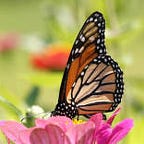FWS Scholar: Matthew Patterson
Matthew Patterson grew up in Flint, Michigan but spent most of his formative years along the Ohio River in Eastern Kentucky. He was always hiking outdoors with his brother and father. Love for the outdoors and the water started from a young age. However, he didn’t really think of biology as a possible profession until college, when a professor who studied darters for his Ph.D. got him excited about biology. Matthew transferred to a larger school that offered field biology, where he helped curate a fish and mussel museum.
He was introduced to native fish and freshwater mussel surveys in 1995 as a seasonal intern with the Kentucky State Nature Preserves Commission in Frankfort, Kentucky. During this internship, he traveled all over the state of Kentucky sampling fish and mussels. He has been hooked on all things freshwater ever since.
After finishing up a bachelor’s in biology at Eastern Kentucky University, Matthew went on to earn a master’s in biology from Virginia Polytechnic Institute and State University. “Go Hokies!” His thesis focused on the biology and feeding physiology of native freshwater mussels and the invasive zebra mussel.
After his stint as a Hokie, he returned to Kentucky to attempt to make his fortune as a rock star! Because emerging rock star does not pay as well as an actual rock star, he kept his day job as a research scientist at Kentucky State University working on the impacts of agricultural pesticides on ground and surface waters. When the band broke up, due to artistic differences, he joined the U.S. Fish and Wildlife Service as a fisheries biologist at the White Sulphur Springs National Fish Hatchery in West Virginia.
Matthew spent his time at the hatchery raising federally endangered freshwater mussels. After 5 years at the hatchery, Matthew took his current job as course leader at the National Conservation Training Center. Matthew is now course leader for a wide array of fisheries related courses including Fisheries Academy, Introduction to Fish Health, Fish Identification, Coldwater Fish Culture, Freshwater Fish Culture, Conservation Biology of Freshwater Mussels, Freshwater Mussel Propagation for Restoration, Freshwater Mussel Identification, Macroinvertebrate Ecology and ID, and Ecology and Conservation of North American Crayfishes.
“The best part about my job is helping adult learners build new field and laboratory skills they can take back to their field station and improve conservation work on the ground.
Improving the work of conservation is so very important, to leave the world a better place for my son and future generations,” says Matthew.
Matthew lives in Shepherdstown, WV with his wife Diana of 24 years, and eleven year old son, Mazi. He loves traveling, hiking, photography, and making homemade craft beers.
To learn more about the world of fish, freshwater mussels, and conservation science and other courses Matthew is involved with, visit the National Conservation Training Center’s course catalog. Matthew created two teaching collections of images: freshwater mussels and freshwater fishes in the National Digital Library to support his courses and anyone looking to improve their ID skills.
He also was editor of the book “Freshwater Mussel Propagation for Restoration”, and his recent article entitled, “A national strategy for the conservation of native freshwater mollusks” is found in the journal of Freshwater Mollusk Biology and Conservation discoverable via USFWS Library. #FWSscholar
